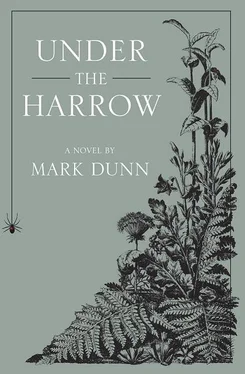Chapter the Fifth. Sunday, June 15, 2003
 ll thoughts of the unfortunate Mrs. Pyegrave having been supplanted by those of Newman and his fretful father and fearful mother (as well as by those of his neither fretful nor fearful older sister Alice whose callous lack of concern for her brother I found to be rather remarkable), I was surprised to discover Antonia waiting for me outside the All Souls Church in the Dell, where I had been dispatched by my sister-in-law Charlotte to solicit a prayer from every morning worshipper on behalf of her missing son. Because I generally spent my Saturday nights in either lengthy scholastic lucubration or equally lengthy frivolous inebriation, both activities typically leaving me abed until nearly noon most Sunday mornings, I seldom found myself communing within these walls, though a friendship since boyhood with the church’s pastor, Vicar Upwitch, sent me to this beautiful edifice perhaps once a week to gather up my ecclesiastical chum and subject him to a lively session of beer-lubricated theological jousting at our favourite public-house (I the inveterate infidel, he the habited keeper of the faith).
ll thoughts of the unfortunate Mrs. Pyegrave having been supplanted by those of Newman and his fretful father and fearful mother (as well as by those of his neither fretful nor fearful older sister Alice whose callous lack of concern for her brother I found to be rather remarkable), I was surprised to discover Antonia waiting for me outside the All Souls Church in the Dell, where I had been dispatched by my sister-in-law Charlotte to solicit a prayer from every morning worshipper on behalf of her missing son. Because I generally spent my Saturday nights in either lengthy scholastic lucubration or equally lengthy frivolous inebriation, both activities typically leaving me abed until nearly noon most Sunday mornings, I seldom found myself communing within these walls, though a friendship since boyhood with the church’s pastor, Vicar Upwitch, sent me to this beautiful edifice perhaps once a week to gather up my ecclesiastical chum and subject him to a lively session of beer-lubricated theological jousting at our favourite public-house (I the inveterate infidel, he the habited keeper of the faith).
“Trimmers! I must speak with you!” Antonia’s hand was upon my sleeve. Her expression gave urgency and some alarm.
“What is it? What’s the matter?”
“Not here. Let us go into the garden.” Antonia’s anxious and furtive manner had drawn the attention of almost every congregant lolling and chatting upon the church lawn prior to the call to worship. There were awkward smiles for those with whom I was fairly well acquainted and polite nods for all the others as Antonia drew her hand through my arm and piloted me, without my having any say in the matter, to the small contemplative garden, which was presently cast in shadow by the church’s campanile towering next to it.
“Here, let us sit,” said Antonia, finally letting go of my arm and patting the wooden bench to which I’d been led under only minor duress. As Antonia smoothed and settled her skirts upon the slatted seat, she asked if there had been any word of my nephew Newman.
“None,” I answered, lowering myself to sit beside her.
“I can only hope that the boy will come to his senses before it’s too late. I am not a woman who prays, but I will keep your family close to my heart in the hours to come.”
“Thank you. So am I to assume that you have some news about Mrs. Pyegrave?”
“I have news and I have a request. The woman is all but dead; that much is clear. She may have expired already. I am certain now that there was some manner of foul play connected with the incident. Where is Muntle, your constabulary friend?”
“At the moment? Perhaps in Regents Park or anyplace else where he can sport about in the sun on his only day off. What is it you would have him do?”
“There’s someone who has a story I should like him to hear: Mrs. Pyegrave’s personal maid. Her name is Tattycoram.”
“From Dickens’ Little Dorrit. ”
“Yes, I believe you’re correct there. It’s an odd name for an odd girl from an odd family — one of the mining families that reside in the hamlet of Blackheath. That is where all the domestic help is coming from these days — the young women and their hacking, wheezing older brothers with black lungs and all-but-empty prospects. That is her history. Here now is her present story: Tattycoram was with Mrs. Pyegrave yesterday when I went to see the woman at the hospital. The girl has grown quite devoted to her mistress and was weeping all the while that I was there, for Dr. Fibbetson had already come in and pronounced her insentient employeress dead, only to correct himself when Tattycoram solicited a second listen for the weak pulse.
“After I had got the distraught creature calmed down to such point as I could understand her through her sniffles, she consented to answer my query about her whereabouts on the night in question. She said that she had been standing just outside the room from which the tumble occurred. And did she, I asked her, overhear anything that took place within the room in those moments that preceded the tragedy? She nodded most solemnly. ‘And have you any reason not to tell me what you heard?’ I put to her. Now she shook her head. In a most desponding voice she replied that there was nothing to be gained from withholding, for the master of the house had just sacked her. He had arranged for a return to her family in Blackheath to-morrow afternoon, which, of course, means this afternoon. Given what she had heard, I asked her if she thought there could have been some reason for the fall, other than pure accident. ‘Upon my very life, I do!’ she had cried, before quickly clapping her hand over her mouth as if she had not intended to make so resounding a vocal declaration.
“‘But you are most uncomfortable telling me here,’ said I. ‘I clearly see, dear girl, the fear that halts your speech. Would you have an objection, then, to speaking of it somewhere else? Someplace where you will neither be seen nor heard by those not of our own choosing?’
“‘I have no such objection,’ the girl replied in a suddenly calm and collected voice, as if the opportunity to disclose all that she knew to those who would not do harm to her by it was that very thing she most desired. Now I have suggested to Tatty that she should meet you and me and, of course, Sheriff Muntle, at two o’clock this afternoon. There are unlet rooms above my stationery shop that should serve. And you’ll bring Muntle with you?”
“I shall make every effort to get him there.”
“Excellent.”
And with that, my investigative friend Antonia Bocker rose to her feet and brushed her hands together to put an abrupt cap upon our exchange. “That is all for now, Trimmers. Go inside and solicit prayers for your nephew. I personally find prayers to be a waste of time, but then I am a lost, heathen soul, so you would be advised to follow your own conscience in the matter.”
Antonia gave my hand a powerful shake, the hardy grip more befitting that of a man than a woman. Then she turned and strode briskly away. I respected my friend Antonia even as I found myself a bit intimidated by her. I had never before known such a woman as she. To be sure, I was acquainted with several women who very much knew their own minds and would never be deterred from doing what they felt to be right and just. My landlady Mrs. Lumbey was just such a woman. But there was a softness to the demeanour of my landlady that was quite missing from the appearance and comportment of Antonia Bocker, her short, wiry iron-grey hair appropriately suggestive of the steel will that strengthened her mettle.
Antonia hadn’t time for tender feelings. There was too much work to be done to allow for any trait that might hinder her from her duties. Perhaps it had not always been so; perhaps in time she would soften in her mien, but for the present, my friend Antonia Bocker was cuirassed in the heavy mail of serious purpose, and it was neither my place nor my intention to seek fault there.

I found Muntle playing quoitswith three of his young deputies upon the green of Regents Park in the West End of Milltown. The park was one of Muntle’s favourite leisure spots and an especially desirable one on Sunday mornings when the more pious Milltowners attended services, and left the skittle, quoits and croquet grounds enticingly empty. “I think that I should like to pitch a tent and live out the rest of my days in this verdant setting,” said Muntle in a comically confiding whisper, “would that the weather remained clement. The cemetery is quiet and serene, but there are ghosts there and not a single hob with which to make a ringer.”
Читать дальше

 ll thoughts of the unfortunate Mrs. Pyegrave having been supplanted by those of Newman and his fretful father and fearful mother (as well as by those of his neither fretful nor fearful older sister Alice whose callous lack of concern for her brother I found to be rather remarkable), I was surprised to discover Antonia waiting for me outside the All Souls Church in the Dell, where I had been dispatched by my sister-in-law Charlotte to solicit a prayer from every morning worshipper on behalf of her missing son. Because I generally spent my Saturday nights in either lengthy scholastic lucubration or equally lengthy frivolous inebriation, both activities typically leaving me abed until nearly noon most Sunday mornings, I seldom found myself communing within these walls, though a friendship since boyhood with the church’s pastor, Vicar Upwitch, sent me to this beautiful edifice perhaps once a week to gather up my ecclesiastical chum and subject him to a lively session of beer-lubricated theological jousting at our favourite public-house (I the inveterate infidel, he the habited keeper of the faith).
ll thoughts of the unfortunate Mrs. Pyegrave having been supplanted by those of Newman and his fretful father and fearful mother (as well as by those of his neither fretful nor fearful older sister Alice whose callous lack of concern for her brother I found to be rather remarkable), I was surprised to discover Antonia waiting for me outside the All Souls Church in the Dell, where I had been dispatched by my sister-in-law Charlotte to solicit a prayer from every morning worshipper on behalf of her missing son. Because I generally spent my Saturday nights in either lengthy scholastic lucubration or equally lengthy frivolous inebriation, both activities typically leaving me abed until nearly noon most Sunday mornings, I seldom found myself communing within these walls, though a friendship since boyhood with the church’s pastor, Vicar Upwitch, sent me to this beautiful edifice perhaps once a week to gather up my ecclesiastical chum and subject him to a lively session of beer-lubricated theological jousting at our favourite public-house (I the inveterate infidel, he the habited keeper of the faith).











